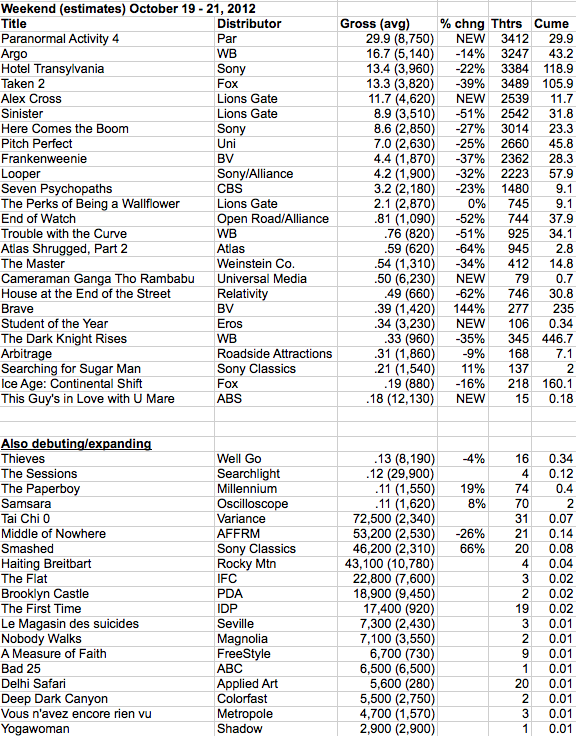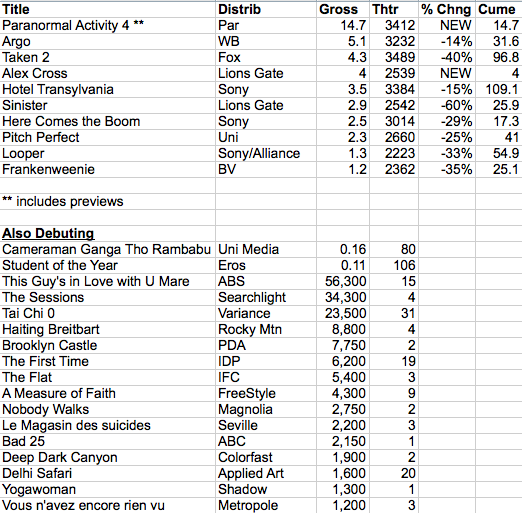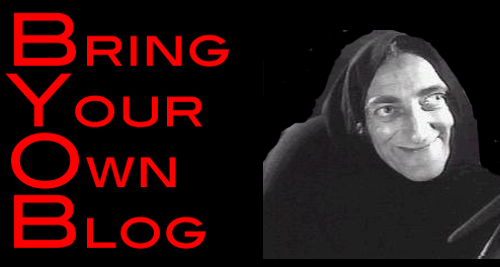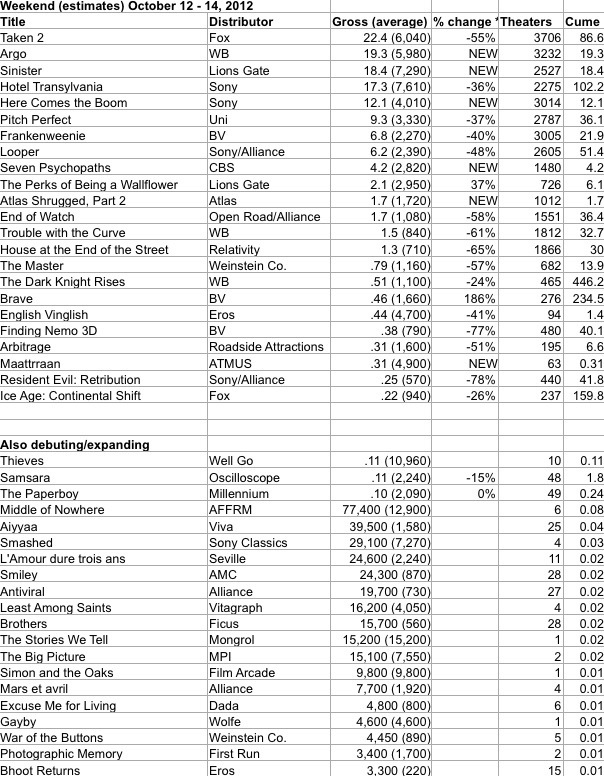The Hot Blog Archive for October, 2012
Weekend Estimates by Alex Crossdress Klady
So… given the history of Paranormal, you’re looking at a $60m domestic total, though international has grown over the last episodes, so look for foreign to be bigger than domestic for the first time with this franchise… though this will still likely be the lowest grosser of the franchise both domestically and worldwide… and still make a bundle.
Not so much Alex Cross, which did okay by some standards… but fails to make the tranny-sition that Tyler Perry has been jones-ing over for years now.
14, 22, 25, 23. Those are the drops for Argo, Hotel Transylvania, Pitch Perfect, and Seven Psychopaths. I’d say that four drops under 25% in the Top 11 is a pretty thing. And I’m not including the #12 movie, The Perks of Being A Wallflower, which held even (0% drop) while adding just 19 screens to get to 745 this weekend.
In fact, the only estimated drop of 40% or worse in the Top 10 this weekend was 51% for Sinister… which isn’t bad for that genre.
Not a lot to be thrilled with in the arthouses. The Sessions did well, but not sensationally. The Paperboy is already petering out. Oscilloscope is thrilled with Samsara’s $2 million, the new high theatrical watermark for the company.
39 Comments »Friday Estimates by KladyNormal 4
Paranormal Activity 4 is looking at opening to $28m – $32m. Friday-vs-Friday is 44% off the last film, but it’s still a lot of money.
Great holds for Argo and Hotel Transylvania. For Ben Affleck, this means a stronger hold after a weaker launch than his The Town, with Argo still about $7m behind his last film at the end of this weekend. The 80m domestic area seems to be where this one is headed. For Hotel T, Sony Animation is looking at crowning its new “best ever” domestic grosser by the end of next weekend.
Alex Cross is a drag for Tyler Perry’s crossover aspirations. It will be his worst career opening on camera. Perhaps they should have called it Tyler Perry’s Alex Cross, leaving out the “i” or “a” and going to his traditional possessive titling. This is not complicated. If Tyler Perry wants to cross over, he needs to do small roles in real movies with real directors, not just try to move his box office power in “urban” cinema to broader audiences. With all due respect, there is a reason why KFC has an old white guy in the bucket. Crossing over means building another brand in Perry’s case. This also means risking, in a real way, the brand he has already established so brilliantly. This isn’t a racial issue. This is branding. It’s not like Denzel was branded as a rapper before he broke through. From the very beginning – St Elsewhere & Carbon Copy – he was branded as a crossover guy. Deal with it, TP.
Solid start for The Sessions, on 4 screens, doing about $25k per. It’s not a home run. There is work to do. And as always, exclusive opening windows do not offer a clear read of where many of these smaller films are headed domestically. But good start.
15 Comments »DP/30: Executive Producer John Battsek, The Imposter/Searching For Sugar Man
DP/30: The Perks Of Being A Wallflower, writer/director Stephen Chbosky, actor Ezra Miller
DP/30: The Sessions, writer/director Ben Lewin, producer Judi Levine
Review: Flight (spoiler-free)
There are so many things to like about Flight, Robert Zemeckis’ 16th feature film and his first live-action film since Cast Away in 2000.
The film is perfectly cast. My history with Zemeckis, of whose work I am a diehard fan, is that I often find his quest for perfection marred by one piece of miscasting. Not so here. There is not a misstep. Denzel, John Goodman, Don Cheadle, Bruce Greenwood, and the real surprise in the mix, Kelly Reilly, who hits it out of the park… all as good as could be. And in smaller roles, Tamara Tunie, Melissa Leo, Peter Gerety, and especially Brian Geraghty… all excellent.
Zemeckis’ eye is as strong as ever, even in basic, chatty scenes. But his powers are especially obvious in – as anyone who’s ever seen an ad for this film knows is coming – the air crash sequence. Zemeckis’ work is actually pretty subtle compared to the current era of filmmaking. He is a magician, really, layering in unexpected context to extremely familiar movie moments.
And the fllm’s ambitions are really unlike any other Zemeckis film. (Quick comparisons to Cast Away or Contact strike me as bizarre.) The film that Paramount is selling isn’t the movie you’ll find on the screen. This is a movie about addiction that happens to be couched in a major air wreck and an alcoholic captain who saved many lives because when push came to shove, his instincts overcame his drunkenness. But mostly, it’s about the drunk, slowly outed by circumstance. The comparison that hit me, while watching the film – having not read the many reviews and comments already out – was The Days of Wine & Roses.
But the movie doesn’t have the emotional kick of Wine & Roses. Why?
Well, this limitation is why Flight isn’t a great movie. I had a similar problem with Shame last year around this time, though I felt that film overcame it more because the film was so clearly focused on the intimate. Flight is more accessible because of all the big studio stuff – the airplane stuff- that distracts from the core. But the emotional daring of Zemeckis’ earlier films is, for me, mostly absent here. We have the big scenes of pain and discovery. But the journey itself is a bit shallow.
The strange thing is, the screenplay seemed to want to push the envelope more than it does. I don’t know whether ideas were developed out or cut out after production. But there seemed to be things being set up that never really paid off the way they probably should have.
I don’t want to include spoilers here, but I will offer this broad stroke. When you put two broken people together, do you expect fireworks or a gentle fire followed by embers burning out quietly? When a guy pulls a Sully Sullenberger, do you expect some real hype around the guy and/or intense confrontations with the press as questions arise?
The movie smartly throws in things the audience craves from start to finish. Every time John Goodman shows up, the audience gets excited. Whenever Denzel turns into DENZEL, the audience gets excited.
The difficulty is, Denzel isn’t DENZEL for most of the movie. He’s mopey or drunk or angry without a focus or… did I say, mopey? Thing is, it’s a pretty flawless performance by Mr. Washington. I can’t fault anything he did as an actor. Some of the actions are previously unseen, but nothing by which a really fine actor like Mr. Washington seemed deeply challenged.
But in terms of the screenplay, DZ’s character, Whip Whittaker, after the crash, is an indie film character, moving for about 100 minutes from A to B (or F to G) in his personal story of fighting alcoholism. Is that reality? Sure. Maybe it’s even slower than that in real life. Trying to kick a long-standing habit in the middle of one of the most stressful events of your life is too much for virtually any human being. But dramatically, it felt, to me, like DENZEL, The Movie Star. was being protected by the filmmakers. Hovering near bottom is interesting for a while, but bottom doesn’t seem like a real bottom for someone as resourceful and skilled at both evasion and denial as Whip Whittaker.
Back to the comparison to Shame… I have friends who have gone through Sex Addiction programs, so I have some secondhand knowledge of how bad things get for people who are truly suffering a sexual addiction. I know a number of real life examples of that bottom… and more horrifyingly, the near bottom but not bottom. One of the problems with Shame finding audience interest outside of movie lovers who admired Steve McQueen’s artistry and the acting fireworks of Fassbender and Mulligan was that many people left the movie still not convinced that its anti-hero was really an addict, as opposed to a really good looking guy who likes to fuck a lot of hot women and is hung up on his sister in a weird way. For as much nudity and sex as is in that film, it was too subtle to be completely real. Serious addiction is often profoundly ugly. And when dramatized, audiences intuitively react when things are not ugly enough, if ugly is what they are offered.
I will give one example from Flight that is not a spoiler… as I won’t give the details. But at one point, Whip is confronted by one of his supporters who mentions that the police had escorted him from somewhere. We don’t see it. But more to the point, for me, is that we saw a drunk Whip pull his car up to the house from which he is later escorted. There is a fire hydrant prominently placed inches away from his front passenger side tire… and he leaves an open alcoholic beverage in the vehicle.
Now, maybe the police and likely trouble with that car was shot. Something was going on there. Zemeckis didn’t have the character park next to a hydrant and do a close up by mistake. And maybe that sequence slowed the movie down more than it helped the movie. Happens.
But that kind of confrontation never happens in the film. The only real notice of the idea that people see Whip as a hero is that we see a couple of moments of Larry King’s Replacement Live saying that it so many words. We get neither the high nor the low. Coincidence? Seems like they were worried about Whip being too unlikeable to ever recover in the eyes of the audience. Or that the film was too much of a downer. I would assume the same about Life of Pi, which has a major movie star in a single scene. Later events suggest strongly that said star had another major sequence, but that the sequence was cut to make things easier on the audience… a cop out that all but killed the movie for me.
I can invert the idea of Flight in my mind… that the events around this alcoholic continued to enable his addiction. But that movie isn’t really there either. It is hinted at occasionally. But instead of the big moment when he confronts his biggest enabler, we get a reprieve from the misery and a laugh. Loved the scene… but not in context.
It could have also been a movie about going through bottom and recovery in public. But that is really almost untouched.
So what you get is a beautifully made film with terrific acting and good lines and some really great moments and one of the great airplane sequences ever… that somehow feels like an half-empty vessel.
If there is an element that is part of the thematic quilt of Zemeckis’ career, it is the meditative nature of both Contact and Cast Away… a nature this film has for instants… but seems to be afraid to dive into fully. People who don’t like those two films seem to consistently be turned off by those parts of the films.
Of course, there are one character in the Zemeckis oeuvre who have much more connective tissue to Whip Whittaker than anyone in Contact or Cast Away. Rudy Russo, who is on the hustle from the opening frames of Used Cars to right near the very end of the film. Of course, Zemeckis’ epic second film is an out-n-out broad comedy. But there are similar bread crumbs, from the missing/dead father figure, the energy around skirting the law, a romance complicated by the anti-hero’s failings, and even a similar motivation for the ultimate moment of acceptance. The reason why Used Cars works better is that Rudy’s ambition is clear, he isn’t ambivalent about his choices, so the audience is along with him, considering his options from start to finish.
I’m not saying that I don’t love a movie that is ambiguous. I tend to prefer it. But there is a way of sitting in that soup that is counter-intuitive for a plane crash movie. That was the biggest challenge of the screenplay for Flight, which has a really interesting idea at its core. Delivering a film that was both an entertainment and a grueling emotional revelation was the hurdle that, if jumped, would have made this a truly great film. But for me, it didn’t get there. The plane crash movie – and the budget and studio money it came with – seems have gotten in the way. This is one of the movies where the audience enjoys the parts more than they feel the sum of those parts.
But I’ll be back to see it again. Mining the good parts of Zemeckis’ life-action return is enough to get me in the room again. One of the truly underappreciated greats.
10 Comments »American Masters Previews geffen: the music years
Watch Inventing David Geffen: Sunset Blvd. on PBS. See more from American Masters.
DP/30: The Sessions, actors John Hawkes, Helen Hunt, William H. Macy

DP/30: Amour, writer/director Michael Haneke (LA 2012)

Please see “DP/30 @ Cannes 2012: Amour, writer/director Michael Haneke” for more conversation specific to this movie.
This Interview interpreted by Robert Grey.
7 Comments »CBS’ Extra Bond Materials From Sunday’s Show
Becoming Bond for a Day
Sean Connery becomes James Bond
Sean Connery’s Bond: Sex symbol?
Sean Connery vs. James Bond
My Week In DP/30: October 8-12, 2013
Cloud Atlas screenwriter/directors Andy Wachowski, Lana Wachowski, and Tom Tykwer, The Sessions stars John Hawkes, Helen Hunt, and William H. Macy, writer/director Ben Lewin, producer Judi Levine, Never Back Down star Maggie Gyllenhaal, The Perks of Being A Wallflower’s novelist/screenwriter/director Stephen Chbosky and co-star Ezra MIller, The Flat documentarian Arnon Goldfinger, executive producer of The Imposter and Searching For Sugar Man, John Battsek, Ethel documentarian Rory Kennedy, and Hyde Park On The Hudson director Roger Michel.
1 Comment »Weekend Estimates by Argo Klady Yourself
So what happens when one movie does under 2.5x its Friday numbers and the film behind it does better than 3.5x Friday? Argo leap frogs Sinister as, in a rare case of a film seeing a real strengthening over opening weekend, adults got aggressive about going to see a movie that virtually everyone was praising. Yay.
Sinister did what horror movies often do.
Taken 2 ends up the #1… which, as usual, is a meaningless stat, except for the marketing hype and ego. An estimated 55% drop isn’t bad for a harshly-reviewed sequel.
Here Comes The Boom got the benefit of its target audience, delivering slightly more than 3x Friday, while Seven Psychopaths did exactly 3x Friday. Atlas Shrugged Dos did almost exactly the same as the first’s opening.
Really nice start for Middle of Nowhere amongst the indies. Not bad for Smashed either.
12 Comments »SNL: iPhone Perspective
Another unusually complex idea on SNL this weekend. Hmmmm…
5 Comments »














